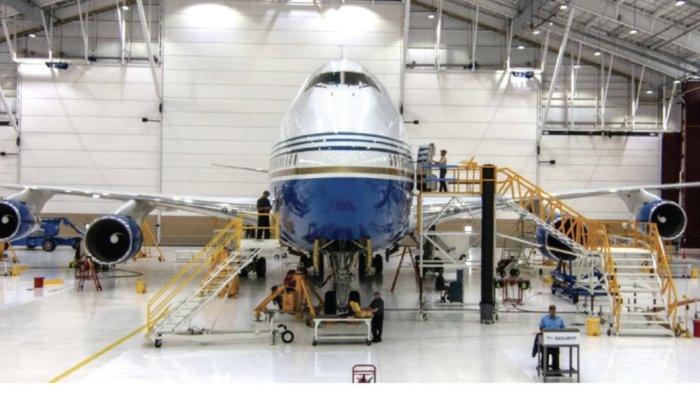RBR Maintenance has been in operation at Dallas Love Field since 1991, when founder Joe Burch leased space at the airport and offered maintenance on Gulfstreams and Hawkers. In the last 20-odd years the business has grown significantly from the original one-man shop and added aircraft to its capabilities.
Burch started out as a car mechanic and in the late 1970s took up flying as a hobby, got his pilot certificate and bought an airplane. Over the next several years he worked up to a multi-engine airline transport pilot certificate and started adding turbine ratings.
When Burch was laid off from the Ford dealership he enrolled at Rice Aviation on Houston Hobby Airport to get his FAA A&P mechanic certificate. After getting an A&P certificate in 1984, Burch worked at Hobby Airport as a mechanic for about a year and then moved to Dallas. He’d been offered a position with Associated Air Center as a mechanic. That position eventually led to a spot in Halliburton’s flight operation maintenance department, working on Gulfstreams, Hawkers and Dash 8s.
When he decided to open his own business, “I capitalized on what I knew and offered maintenance on Gulfstreams and Hawkers. I was a one-man operation and sometimes that’s tough to do. So when I needed another set of hands I’d call friends of mine at the local FBO to come help me jack up an airplane, then I’d work on it and call them back to help me down jack it. I don’t think I could have gotten the company off the ground without the help of my friends.” At the same time, Burch was also teaching Hawker and Gulfstream maintenance part time at SimuFlite.
Business Expands
In the mid-1990s one of the company’s customers added a Cessna Citation 550. RBR began maintaining it, attracting other Citation customers. As the business expanded the MRO added other types.
“Business had picked up significantly, plus several of my customers began asking me to fly copilot on their Hawkers because they recognized the advantage of having a licensed mechanic on board. For instance, I was on a Hawker trip when we got a generator light en route to California. I used the Aircell to call my shop, they dispatched a generator and voltage regulator to our destination, I worked on the aircraft that night and we were ready to dispatch on time the next morning.”
RBR’s business continued to grow, supported by an increasing number of full-time and contract mechanics, including James Noe, an A&P, IA and avionics electrical repair mechanic.
“Jim worked for me on and off for several years until he joined our staff full time in 2003, when he became co-owner of RBR. By that time we had about six mechanics working fairly regularly and four as full-time employees.”
Currently RBR has a staff of 22 (12 full-time and 10 contract) employees. Fifteen are dedicated to maintenance, including four IA technicians, and two are certified pilots. RBR operates out of a 12,000-sq-ft space that supports an FBO operation and maintenance. There is also 3,000 sq ft of office space and an additional 16,000-sq-ft hangar for overflow.
The MRO works on the 125-series Hawkers; the Gulfstream III, IV and V; Citation 500/525/550/560/650/680; Phenom 100 and 300; and the Falcon 50. Engine expertise includes the TFE731; JT15D, PW530, PW535, PW545 and PW617; and FJ44.
The company also offers onsite instrument testing and repairs, including FAR 91-411 and 413 tests, RVSM testing, and sheet metal and structural repair and modifications. RBR also has established partnerships with an avionics shop, interior refurbishment and upgrade shop, and it provides major engine support through Honeywell and Dallas Airmotive among others.
Though RBR currently works on a number of types, “we’re still best known for what we’ve been doing since our beginning: working on Hawkers. We have Hawker operators coming to us from as far away as Seattle,” Burch said. “One of the things we pride ourselves on is the ability to be flexible to meet the demands of the marketplace. For example, when RVSM installations were at their peak we researched the issue, secured the appropriate STC and installed them for our Hawker customers. We did the same thing when operators were required to install Tcas. We’re now in the process of researching ADS-B requirements and intend to offer [those upgrades] to our customers too.”
RBR has also recently begun offering mobile maintenance service. The MRO has outfitted a truck and trailer with a set of jacks, tooling and personnel to support its operators in the south central region. “We’ll also dispatch maintenance personnel via the airlines to solve AOG problems for our customers,” Burch said.
“We are constantly looking for ways to better serve our customers as our business continues to grow. One area we’re watching closely is the significant growth in business aviation in West Texas related to oil and gas industry activity. We’re exploring the possibility of opening a second maintenance facility there to support it.”







